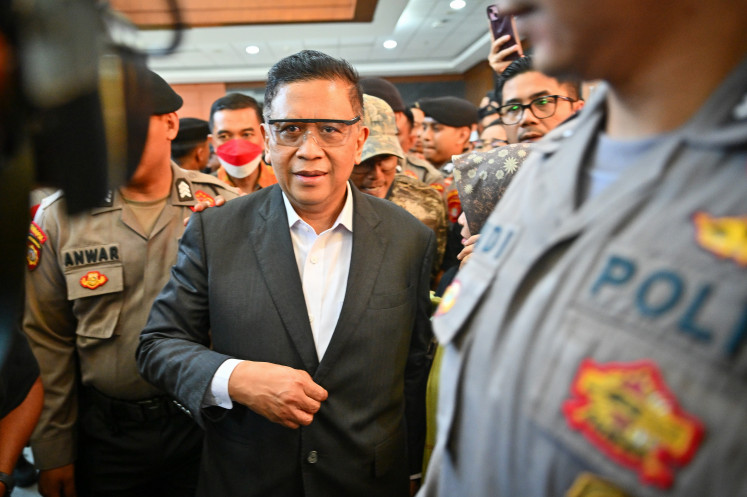Popular Reads
Top Results
Can't find what you're looking for?
View all search resultsPopular Reads
Top Results
Can't find what you're looking for?
View all search resultsDe-dollarization through the framework of LCS
The LCS initiative is basically an effort to avoid the potential drawbacks of too much dependency on the US dollar.
Change text size
Gift Premium Articles
to Anyone
A
mid the struggle of the pandemic, Indonesia has never stopped trying to be getting better. Bank Indonesia (BI) has expanded the local currency settlement (LCS) framework for cross-border transactions.
After establishing the LCS with Bank Negara Malaysia and Bank of Thailand in 2016, as well as Japan's Ministry of Finance in 2020, BI launched the most recent LCS framework cooperation with the People’s Bank of China. The options are now ample, consisting of the Indonesian rupiah, Malaysian ringgit, Thailand baht, Japanese yen and Chinese yuan, depending on which country is involved in the transaction.
The LCS initiative is basically an effort to avoid the potential drawbacks of too much dependency on the US dollars. Studies show that 90 percent or equal to US$269 billion of overseas Indonesian transactions were made using US dollars in 2020. In the meantime, there was less than 9 percent of Indonesia-US trading on goods and services. This data shows that we are still entangled with the influential power of the US dollar for less obvious reasons.
The US dollar is indeed the global reserve currency. This began long ago when the Bretton Woods arrangement of 1944 selected the American proposal of Harry Dexter White instead of his competitor John Maynard Keynes of Great Britain. The US had a major win over the global political economy, which has carried over through the decades, until today.
Charles de Gaulle of France back then blatantly called out the “exorbitant privilege” of the US through its currency power. Then in 1971, then-US president Richard Nixon suspended the US dollar convertibility into gold for inward economic reasons. The gold monetary standard was effectively abandoned and thereby strengthened the position of the US dollar as the global reserve currency.
Had Keynes won the battle of Bretton Woods, we might be living a different story. Keynes proposed a comprehensive design of global financial architecture consisting of an international clearing union (ICU) and international currency denomination of the “bancor”. The bancor embeds the feature of adjustment burden for debtor countries and is supposed to settle international balances. Bancor might seem similar to the International Monetary Fund's Special Drawing Rights (SDRs) at glance, but it is functionally different. All in all, the die was cast.
Anchoring from the great wisdom of Keynes, Robert Hockett of the Cornell Law School proposed the merger of the IMF and the Bank for International Settlements to become equivalent with the Keynesian ICU. But redesigning the global financial architecture requires a political consensus. While the political constellation should be built upon, BI offers a more regional-based and viable solution through the LCS.
The LCS works as an initiative to untwine the dependency on the US dollar. By the same token, the LCS supports Indonesia’s geopolitics and strengthens the regional-based economic power. The idea of the LCS came from the realization of domestic businesses’ vulnerability to US dollar fluctuations.
From the macro perspective, businesses face foreign exchange (FX) risks, articulated by the “n+1” problem. The “n” represents the rupiah as the Indonesian currency, and the “1” is the counterparty’s currency. In addition to the domestic dynamics, such as inflation, economic sentiment and the law of supply-demand, the FX value faces external factors beyond domestic control. Relative to the US dollar, the rupiah value could be affected by US economic conditions and US government policies.
Businesses conducting overseas transactions are even exposed to the “n+2” problem, i.e., due to required double-step currency conversions through the US dollar. This condition raises the complexity of corporates’ hedging positions, which might not necessarily solve the risks. The LCS framework is drawn upon to respond to this situation.
The LCS simplifies the FX risks back to “n+1”. Businesses could efficiently convert their money to the settlement currency without making a prior conversion to US dollars. Even better for domestic parties, when the rupiah is selected to be the contractual currency, the FX risks are zero.
BI secures the LCS with strategic partners by duly contemplating the essential factors. All the existing counterparts hold currency dynamics that have high statistical correlations in comparison with the rupiah. That effectively brings businesses toward a more stable environment. Hence, the private sector could boost productivity by leveraging the more efficient transaction costs.
The LCS framework is also forecasted to support financial deepening in Indonesia. The implementation is consistent with the blueprint for the 2025 money market development (BPPU) launched by BI on Dec. 14, 2020. The LCS opens more options for FX risk management and would expand the variety of FX market participants and currencies traded. A more active market would support the pricing discovery, which makes the price more credibly represent market conditions.
The implementation of the LCS involves the central role of appointed cross-currency dealer (ACCD) banks. Privates need to open a subspecial purpose a nonresident account (Sub-SNA) in an ACCD bank and present the underlying economic activities for LCS transactions. Not only does it cover international trading on goods and services, but the LCS also functions as income transfers and direct investments, including finances.
The LCS effectively represents the de-dollarization of Indonesia’s international transactions. The LCS framework would also likely support economic recovery from the pandemic, which still entails the uncertainty of the value of the US dollar. The effort is consistent with the tagline “recover together, recover stronger” brought up by President Joko “Jokowi” Widodo for the G-20 Presidency.
We should hope the LCS framework will be strengthened from time to time. More strategic partners, the expansion of eligible underlying transactions for the LCS and increasing the number of ACCD banks involved are among the ways to do so.
***
The writer is an advisor in the Legal Affairs Department, Bank Indonesia (BI). The views expressed are his own.










